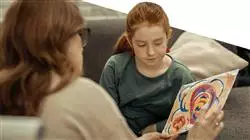University certificate
The world's largest faculty of psychology”
Introduction to the Program
This Postgraduate diploma provides you with a wide knowledge with the most recent content on Behavior Modification, Classical and Operant Conditioning Based Therapies and its application in each patient”

This Postgraduate diploma is aimed at the psychology professional who wishes to acquire a specialization in their area with an in-depth and detailed learning, which will take a look at the historical evolution of psychological therapies to the present. A study plan that has a wide multimedia content in which video summaries and additional readings will provide students with an updated, innovative and in accordance with the current needs of students.
This 100% online teaching will start from the roots of psychology and go into the theoretical-practical framework of psychoanalysis, the Western schools with special emphasis on the French school and British, American and Russian psychology. Also, it will go into the main schools of thought of psychology that emerged in the 20th century, such as Gestalt, Behaviorism, Humanism, Cognitivism or Constructivism.
The program will also delve into the emergence of third-generation therapies, where the patient's experience becomes a key element together with the social and cultural context in which there has been a lack of adaptation in their behavior. A teaching that will emphasize the evolution of Cognitive-Behavioral psychology itself, and will give relevance to the role of the therapist in clinical consultation.
An online diploma that provides the psychologist the ease of taking it comfortably, wherever and whenever they want. They will only need a device with internet access to access all the most updated and modern multimedia content available in high-level education from day one. This way, students will be able to distribute the teaching load of this program according to their needs, allowing them to perfectly combine their work responsibilities with a quality university education.
Download the multimedia content and view it whenever and wherever you want”
This Postgraduate diploma in Behavior Modification, Classical and Operant Conditioning Based Therapies contains the most complete and up-to-date program on the market. The most important features include:
- The development of case studies presented by experts in psychology and cutting-edge therapies
- The graphic, schematic, and practical contents with which they are created, provide scientific and practical information on the disciplines that are essential for professional practice
- The practical exercises where the self-evaluation process can be carried out to improve learning
- Its special emphasis on innovative methodologies
- Theoretical lessons, questions to the expert, debate forums on controversial topics, and individual reflection assignments
- Content that is accessible from any fixed or portable device with an Internet connection
With this diploma you will be up to date with the latest techniques in managing difficult discussions and conversations”
The program’s teaching staff includes professionals from the sector who contribute their work experience to this educational program, as well as renowned specialists from leading societies and prestigious universities.
Its multimedia content, developed with the latest educational technology, will allow the professional a situated and contextual learning, that is, a simulated environment that will provide an immersive training programmed to train in real situations.
The design of this program focuses on Problem-Based Learning, in which the professional will have to try to solve the different professional practice situations that will arise throughout the academic course. For this purpose, the student will be assisted by an innovative interactive video system created by renowned experts.
This Postgraduate diploma will show you the skills most commonly used by therapists in Counselling in healthcare environments"

A 100% online program that allows you to distribute the course load according to your needs. TECH Global University adapts to your needs"
Why study at TECH?
TECH is the world’s largest online university. With an impressive catalog of more than 14,000 university programs available in 11 languages, it is positioned as a leader in employability, with a 99% job placement rate. In addition, it relies on an enormous faculty of more than 6,000 professors of the highest international renown.

Study at the world's largest online university and guarantee your professional success. The future starts at TECH”
The world’s best online university according to FORBES
The prestigious Forbes magazine, specialized in business and finance, has highlighted TECH as “the world's best online university” This is what they have recently stated in an article in their digital edition in which they echo the success story of this institution, “thanks to the academic offer it provides, the selection of its teaching staff, and an innovative learning method aimed at educating the professionals of the future”
A revolutionary study method, a cutting-edge faculty and a practical focus: the key to TECH's success.
The most complete study plans on the university scene
TECH offers the most complete study plans on the university scene, with syllabuses that cover fundamental concepts and, at the same time, the main scientific advances in their specific scientific areas. In addition, these programs are continuously being updated to guarantee students the academic vanguard and the most in-demand professional skills. In this way, the university's qualifications provide its graduates with a significant advantage to propel their careers to success.
TECH offers the most comprehensive and intensive study plans on the current university scene.
A world-class teaching staff
TECH's teaching staff is made up of more than 6,000 professors with the highest international recognition. Professors, researchers and top executives of multinational companies, including Isaiah Covington, performance coach of the Boston Celtics; Magda Romanska, principal investigator at Harvard MetaLAB; Ignacio Wistumba, chairman of the department of translational molecular pathology at MD Anderson Cancer Center; and D.W. Pine, creative director of TIME magazine, among others.
Internationally renowned experts, specialized in different branches of Health, Technology, Communication and Business, form part of the TECH faculty.
A unique learning method
TECH is the first university to use Relearning in all its programs. It is the best online learning methodology, accredited with international teaching quality certifications, provided by prestigious educational agencies. In addition, this disruptive educational model is complemented with the “Case Method”, thereby setting up a unique online teaching strategy. Innovative teaching resources are also implemented, including detailed videos, infographics and interactive summaries.
TECH combines Relearning and the Case Method in all its university programs to guarantee excellent theoretical and practical learning, studying whenever and wherever you want.
The world's largest online university
TECH is the world’s largest online university. We are the largest educational institution, with the best and widest online educational catalog, one hundred percent online and covering the vast majority of areas of knowledge. We offer a large selection of our own degrees and accredited online undergraduate and postgraduate degrees. In total, more than 14,000 university degrees, in eleven different languages, make us the largest educational largest in the world.
TECH has the world's most extensive catalog of academic and official programs, available in more than 11 languages.
Google Premier Partner
The American technology giant has awarded TECH the Google Google Premier Partner badge. This award, which is only available to 3% of the world's companies, highlights the efficient, flexible and tailored experience that this university provides to students. The recognition as a Google Premier Partner not only accredits the maximum rigor, performance and investment in TECH's digital infrastructures, but also places this university as one of the world's leading technology companies.
Google has positioned TECH in the top 3% of the world's most important technology companies by awarding it its Google Premier Partner badge.
The official online university of the NBA
TECH is the official online university of the NBA. Thanks to our agreement with the biggest league in basketball, we offer our students exclusive university programs, as well as a wide variety of educational resources focused on the business of the league and other areas of the sports industry. Each program is made up of a uniquely designed syllabus and features exceptional guest hosts: professionals with a distinguished sports background who will offer their expertise on the most relevant topics.
TECH has been selected by the NBA, the world's top basketball league, as its official online university.
The top-rated university by its students
Students have positioned TECH as the world's top-rated university on the main review websites, with a highest rating of 4.9 out of 5, obtained from more than 1,000 reviews. These results consolidate TECH as the benchmark university institution at an international level, reflecting the excellence and positive impact of its educational model.” reflecting the excellence and positive impact of its educational model.”
TECH is the world’s top-rated university by its students.
Leaders in employability
TECH has managed to become the leading university in employability. 99% of its students obtain jobs in the academic field they have studied, within one year of completing any of the university's programs. A similar number achieve immediate career enhancement. All this thanks to a study methodology that bases its effectiveness on the acquisition of practical skills, which are absolutely necessary for professional development.
99% of TECH graduates find a job within a year of completing their studies.
Postgraduate Diploma in Behavior Modification, Classical and Operant Conditioning Based Therapies.
Behavior modification is a psychology technique that aims to promote change in a person's behavior through the use of scientific and empirical techniques. This technique is based on the idea that human behavior can be learned and unlearned through the application of specific techniques. At TECH Global University we have this specialized program designed with the objective of providing theoretical understanding and practices in modifying behaviors through classical and operant conditioning techniques.
Therapies based on classical conditioning (also known as Pavlovian-type therapies or responder-type therapies) focus on the idea that behaviors can be learned and controlled by associating an automatic response to a specific stimulus. For example, this technique can be used to help a person overcome phobias or addictions by "teaching" the brain to associate a stimulus (such as an image or sound) with a more appropriate emotional response (such as calmness or serenity). On the other hand, therapies based on operant conditioning (also known as Skinnerian-type therapies or instrumental-type therapies) focus on the idea that any behavior can be learned or reinforced by experiencing consequences that follow it. Here, the main goal of therapy is to help the individual develop new behavioral techniques to replace inappropriate or undesirable behaviors. It is an excellent option for those who wish to acquire specialized skills and develop a successful career in this field.
"







